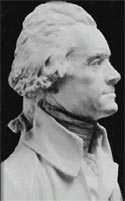 |
"Nothing is more certainly written in the book of fate that these people [the Negroes] are to be free. Nor is it less certain that the two races, equally free, cannot live in the same government. Nature, habit, opinion has drawn indelible lines of distinction between them." —Thomas Jefferson |
Perhaps Jefferson was wrong in his opinion, I thought, but why have his words been twisted completely opposite to his original intent? I remembered my visit the rotunda of the Jefferson Memorial, when I had stared up in reverence at those words across from the magnificent statue of Jefferson himself. Now, I knew those words etched in granite were a lie.
The rest of those powerful words had simply gone down what the writer George Orwell called the "memory hole" in his classic book 1984? 1 If the establishment would blatantly suppress and distort a historical fact as important as this, I wondered if there were other important deceptions about race. Putnam exposed many more.
Martin Luther King's 1964 Civil Rights March on Washington held its rally at the Lincoln Memorial. I knew that Lincoln was opposed to the institution of slavery, as was Jefferson, but what would Lincoln's opinion be on the march for racial integration and racial equality that assembled on the steps of his imposing memorial? Here are some of Lincoln's surprising sentiments on the issue:
Negro equality. Fudge! How long in the Government of a God great enough to make and maintain this Universe, shall there continue knaves to vend and fools to gulp, so low a piece of demagoguism as this? (The Collected Works of Abraham Lincoln, edited by Roy P. Basler, Rutgers University Press, 1953, September 1859 (Vol. III p. 399)) 2
In an address at Springfield, Illinois, on June 26, 1857:
A separation of the races is the only perfect preventive of amalgamation, but as immediate separation is impossible the next best thing is to keep them apart where they are not already together... Such separation, if ever affected at all, must be effected by colonization... The enterprise is a difficult one, but 'where there is a will there is a way;' and what colonization needs now is a hearty will. Will springs from the two elements of moral sense and self-interest. Let us be brought to believe it is morally right, and at the same time, favorable to, or at least not against, our interest, to transfer the African to his native clime, and we shall find a way to do it, however great the task may be. (Vol. II, pp. 408-9) 3
In the famous Lincoln-Douglas Debates in Charleston, Illinois, Lincoln said:
I am not, nor ever have been in favor of bringing about in any way the social and political equality of the white and black races. I am not nor ever have been in favor of making voters or jurors of Negroes, nor qualifying them to hold office, nor to intermarry with White people; and I will say in addition to this that there is a physical difference between the white and black races which I believe will ever forbid the two races living together on terms of social and political equality. (Fourth Debate with Stephen A. Douglas at Charleston, Illinois on September 18, 1858 (Vol. III pp. 145-461))4
- Orwell, G. (1982). . New York: Harcourt Brace Jovanovich.
- Lincoln, A. (1953-55). Collected Works. The Abraham Lincoln Assoc. Springfield, Illinois. Roy P.Basler, Editor; Marion New Brunswick, N.J.: Rutgers University Press. Contents: Vol. 1. 1824-1848.--2. 1848-1858.--3. 1858-1860.--4. 1860-1861.--5. 1861-1862.--6. 1862-1863.--7. 1863-1864.--8. 1864-1865. - Index.
- Lincoln, A. (1953-55). Collected Works.
- Lincoln, A. (1953-55). Collected Works.
|
|
|